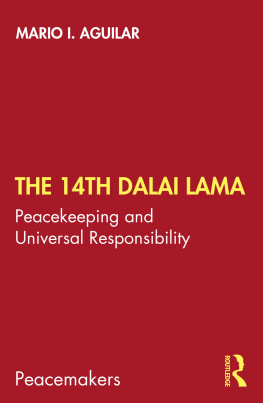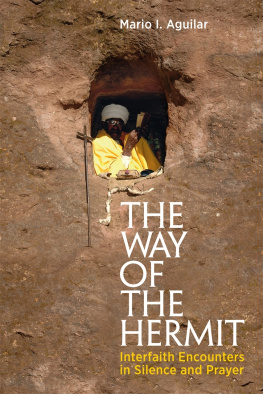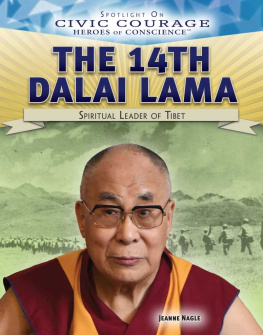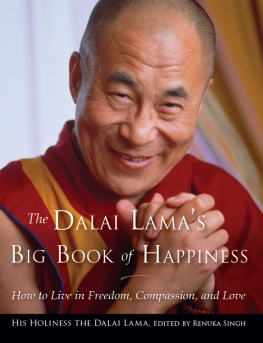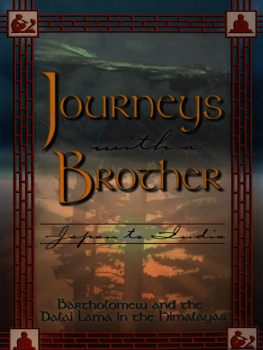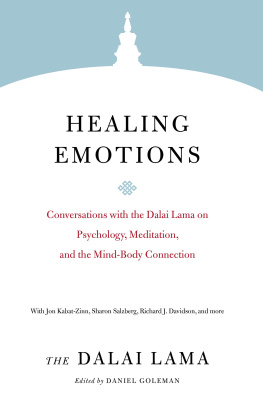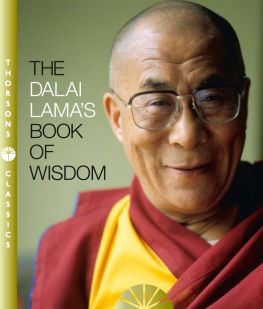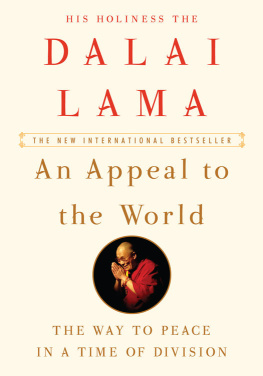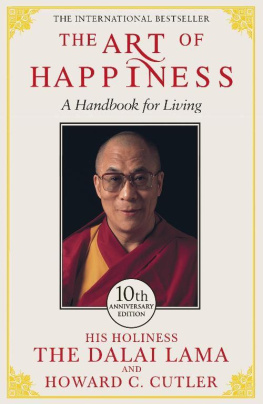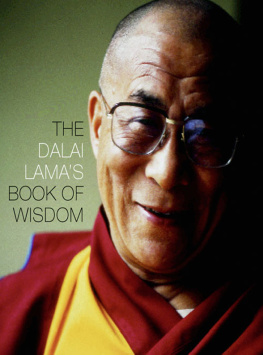THE 14TH DALAI LAMA
This book outlines the life of spiritual diplomacy of the 14th Dalai Lama and his emergence as a global peace icon. It traces his evolution as a Tibetan Buddhist monk rooted in the Geluk tradition, as a Nobel laureate, and as an internationally recognized peacemaker.
The volume brings to the fore the Dalai Lamas monastic life grounded in the compassion and ethical responsibility of a bodhisattva, somebody who is willing to renounce samsara for the benefit of others, as well as that of a political leader of Tibet. It examines the deep impact of his ideas of peacekeeping and universal responsibility on world politics, which draw on acceptance, inclusion, and respect as their central pillars. Further, this book highlights his departure from the practices of the earlier Dalai Lamas, and how the Chinese invasion and his exile in India transformed him into a universal figure of peace, rather than solely being the leader of Tibet.
An introspective read, this book will be of much interest to readers interested in spiritual diplomacy and political philosophy. It will also be of interest to scholars and researchers of peace and conflict studies, international relations, politics, and religion, especially Buddhism.
Mario I. Aguilar is Professor of Religion and Politics at the School of Divinity, St Marys College, University of St Andrews, United Kingdom. A few of his recent publications include Church, Liberation and World Religions: Towards a ChristianBuddhist Dialogue (2012), Pope Francis: His Life and Thought (2014), Christian Ashrams, Hindu Caves, and Sacred Rivers: ChristianHindu Monastic Dialogue in India 19501993 (2016), The Way of the Hermit: Interfaith Encounters in Silence and Prayer (2017), and Interreligious Dialogue and the Partition of India: Hindus and Muslims in Dialogue about Violence and Forced Migration (2018). His research interests include the study of religion; religion in the contemporary world; theology in Latin America and Africa; contextual theology; biblical studies and anthropology; Islam in Africa; the history of Tibet and Tibetan Buddhism; ChristianBuddhist dialogue; Hinduism, particularly monasticism in India; ChristianHindu dialogue; and Hindu texts.
PEACEMAKERS
Series Editor: Ramin Jahanbegloo,Executive
Director of the Mahatma Gandhi Centre for
Nonviolence and Peace Studies and the Vice-Dean of
the School of Law at Jindal Global University, India
Peace is one of the central concepts in the spiritual and political life of humanity. Peace does not imply the absence of war. It implies harmony, justice and empathy. Empathy is the key to education of peace in our world. In other words, despite the vast differences of values between cultures and traditions, it is still possible to grasp an understanding of one another, by empathy. Throughout centuries, peacemakers have endorsed a shared human horizon, which according to them had the critical force of avoiding moral anarchy and relativism while acknowledging the plurality of modes of being human.
Today in a different manner and in a changed tone, but with the same moral courage and dissenting voice, this series on Peacemakers offers the first comprehensive engagement with the problems of peace in our age, through a meticulous and thorough study of the lives and thoughts of peacemakers of all ages.
MAHATMA GANDHI: A NONVIOLENT PERSPECTIVE ON PEACE
Ramin Jahanbegloo
THE 14TH DALAI LAMA: PEACEKEEPING AND UNIVERSAL RESPONSIBILITY
Mario I. Aguilar
For more information about this series, please visit: www.routledge.com/Peacemakers/book-series/PCMK
First published 2021
by Routledge
2 Park Square, Milton Park, Abingdon, Oxon OX14 4RN
and by Routledge
52 Vanderbilt Avenue, New York, NY 10017
Routledge is an imprint of the Taylor & Francis Group, an informa business
2021 Mario I. Aguilar
The right of Mario I. Aguilar to be identified as author of this work has been asserted by him in accordance with sections 77 and 78 of the Copyright, Designs and Patents Act 1988.
All rights reserved. No part of this book may be reprinted or reproduced or utilised in any form or by any electronic, mechanical, or other means, now known or hereafter invented, including photocopying and recording, or in any information storage or retrieval system, without permission in writing from the publishers.
Trademark notice: Product or corporate names may be trademarks or registered trademarks, and are used only for identification and explanation without intent to infringe.
British Library Cataloguing-in-Publication Data
A catalogue record for this book is available from the British Library
Library of Congress Cataloging-in-Publication Data
A catalog record has been requested for this book
ISBN: 978-0-367-44254-5 (hbk)
ISBN: 978-0-367-44260-6 (pbk)
ISBN: 978-1-003-00859-0 (ebk)
Typeset in Sabon
by codeMantra
THIS WORK IS DEDICATED TO
TENZIN GYATSO, HIS HOLINESS
THE XIV DALAI LAMA
TO ALL TIBETANS.
Peace is one of the central concepts of the spiritual and political life of humanity. When we study the worlds religious and philosophical teachings, whether they are from the East or the West, we see that one of the basic ideals of all religions is peace. Peace does not imply simply absence of war. It implies harmony, justice, and empathy. Empathy is the key to education of peace in our world. In other words, despite the vast differences of values between cultures and traditions, it is still possible to grasp an understanding of one another, by empathy. Therefore, we can maintain that all cultures have a shared core of common humanity. Throughout centuries, peacemakers endorsed a shared human horizon, which according to them had the critical force of avoiding moral anarchy and relativism while acknowledging the plurality of modes of being human. As a matter of fact, the first step for peacemakers has always been to assume that not only there are differences among nations, cultures and traditions of thought, but also to admit that people may have different value systems, which need to be understood and approached dialogically and critically. Philosophy of peace is, thus, expressed here in the idea of a self-respecting community or nation, which strives to remove its own imperfections instead of necessarily judging others. As a result, peacemaking is always a call not only to cultivate humility but also to foster pluralism. Such a view is essential if we are to avoid the danger of cultural conformity and move towards the recognition of shared values of humanity and the acceptance of what Martin Luther King, Jr. called the cosmic companionship. Put differently, we can say that it would be an error to hope that we can ever achieve a truly universal vision of peace without an intercultural approach to the idea of civilization. Peacemakers have always been in favor of a farsighted peacemaking in our world, which has seriously advocated the logic of solidarity and civic friendship beyond national selfishness and global exclusion. Let us not forget that all peacemakers, either man or woman, young or old, from the West or the East, were all engaged in the process of peace seeking by fighting for care, openness, and empathy as constructive forms of being together. Today in a different manner and in a changed tone, but with the same moral courage and dissenting voice, this series on Peacemakers offers the first comprehensive engagement with the problems of peace in our age, through a meticulous and thorough study of the lives and thoughts of peacemakers of all ages.

